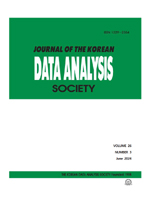조선업 생산직 근로자의 셀프리더십이 일탈행동에 미치는 영향: 자기효능감과 직무만족의 매개효과
The impact of self-leadership on deviant behavior of shipbuilding production workers: Mediating effect of self-efficacy and job satisfaction
- 한국자료분석학회
- Journal of The Korean Data Analysis Society (JKDAS)
- Vol.26 No.4
-
2024.081175 - 1189 (15 pages)
-
DOI : 10.37727/jkdas.2024.26.4.1175
- 37

조선업 현장 생산직 근로자의 셀프리더십이 자기효능감과 직무만족을 통하여 일탈행동에 미치는 영향을 분석하였다. HJ중공업 및 사내 협력업체에 재직 중인 생산직 근로자를 대상으로 회수된 총 336부의 설문지를 활용하여, PROCESS macro 병렬 다중매개모형을 이용하였다. 연구 결과, 셀프리더십은 자기효능감과 직무만족에 긍정적인 영향을 미치고, 자기효능감은 일탈행동에 긍정적인 영향을 미쳤다. 셀프리더십은 일탈행동에 직접 영향을 미치지 않고 자기효능감을 통해서만 영향을 미치는 자기효능감의 완전 매개효과를 파악하였다. 본 연구의 시사점은 일탈행동을 줄이기 위해서는 목표를 달성하기 위해 스스로 행동을 잘 조직하고 실행하는 셀프리더십이 자신이 한 일에 대해 즐거운 생각을 하는 내적 보상인 자기효능감을 강화하고, 조선업 생산직 근로자의 일탈행동을 줄일 수 있다는 것이다. 따라서 직무만족을 높이기 위한 여러 가지 회사 차원의 외적인 보상도 중요하지만, 생산직 근로자가 스스로 자신의 목표를 설정하고 실행하여 이를 통하여 보상받을 수 있도록 동기를 부여 해주는 것이 셀프리더십을 높일 수 있고, 이러한 셀프리더십이 스스로 역할에 대한 성취감인 자기효능감을 높이고, 이를 통해 일탈행동을 줄일 수 있다.
The impact of self-leadership of production workers in the shipbuilding industry on deviant behavior through self-efficacy and job satisfaction was analyzed. A PROCESS macro parallel multiple mediation model was used using a total of 336 questionnaires collected from production workers working at HJ Heavy Industries and its in-house partner companies. As a result of the study, self-leadership had a positive effect on self-efficacy and job satisfaction, and self-efficacy had a positive effect on deviant behavior. As a result, self-leadership had a positive effect on deviant behavior through self-efficacy. The implications of this study are that in order to reduce deviant behavior, self-leadership, which involves organizing and executing one's own actions well to achieve a goal, strengthens self-efficacy, which is an internal reward of feeling happy about one's work, and reduces deviant behavior among shipbuilding production workers. This means that behavior can be reduced. Therefore, although various company-level external rewards are important to increase job satisfaction, motivating shipbuilding production workers to set and execute their own goals and receive rewards through them can increase self-leadership. Leadership can increase self-efficacy, which is a sense of accomplishment in one's role, and through this, reduce deviant behavior.
1. 서론
2. 이론적 배경 및 연구가설 설정
3. 연구방법
4. 연구결과
5. 결론
Reference
(0)
(0)